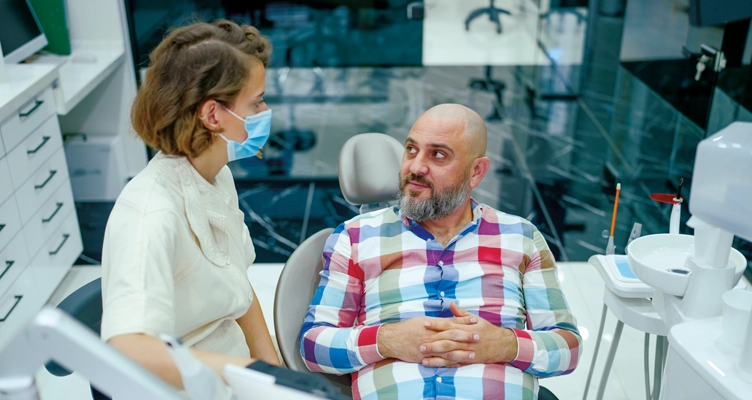Men are more likely to have poor oral health habits.
Oral health challenges unique to men
Men are more likely than women to suffer from gum disease, dental trauma, oral cancers, and other dental issues. Why are they at higher risk for some oral health problems? There are a few different reasons, and some are more preventable than others.
In general, men brush and floss less than women. This allows bacteria and plaque to build up in the mouth, eventually leading to cavities, tooth decay, and gum disease.
Men skip their scheduled dental cleanings more often.
Instead, they tend to visit the dentist after a problem has worsened — making treatment more difficult and expensive! It’s important to go to your routine preventive checkups to receive a cleaning and an oral health exam, which helps your dentist diagnose and treat problems early.
Men are more likely to drink alcohol and use tobacco.
Alcohol and tobacco use increase your risk for many oral and overall health problems: gum disease, tooth decay, several types of cancer, heart disease, weight gain and obesity, and more.
Men spend more time in the sun.
Extra exposure to the sun’s ultraviolet (UV) rays creates a higher risk for oral and skin cancers. Time in the sun can also create symptoms of dehydration, like dry mouth and bad breath.
Men lose testosterone as they age.
As men age, naturally lower testosterone levels can contribute to tooth loss and gum recession. It may also play a part in the development of chronic gum disease, but more research is needed to understand if there is a link.
Men sustain more oral injuries from games and sports.
Men are less likely to wear mouth guards and are more likely to suffer injury in contact sports such as football, basketball, hockey, soccer, or wrestling.
How to protect your teeth and gums
For many men, better oral health may be as simple as changing a few habits and practicing good preventive care.
When you’re caring for your smile, the best offense is a good defense:
Men: Take care of your oral health!
Men do have a higher risk of oral health problems, but much of this risk can be reduced or avoided. Daily care and a few simple lifestyle changes can help you maintain your smile and overall wellness.












